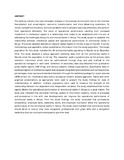| dc.description.abstract | The banking industry has had noticeable changes in its business environment due to the financial liberalization and consolidation, economic transformation and more discerning customers. To remain competitive therefore, commercial Banks have to allocate resources effectively and perform their operations efficiently. The value of operational performance resulting from increased investment in intellectual capital is a relationship that needs to be established with the aim of addressing the challenges facing the commercial banks in Kenya. The study sought to establish the relationship between intellectual capital and operational performance of commercial banks in Kenya. This study adopted descriptive research design based on the key areas of interest. A survey methodology was applied to collect quantitative information from the study population. The target population for this study included the 44 commercial banks operating in Nairobi as at December 2013. The study adopted a census approach collecting data from all the commercial banks in Nairobi since the population is not big. The researcher used a questionnaire as the primary data collection instrument which were be administered through drop and pick method to the operational managers in each bank. Collection of secondary data was obtained from publication press; banks reports, NSE filings, and various research related organizations. Quantitative data on banks perception of intellectual capital was analyzed using descriptive statistics such as frequencies, percentages, mean scores and standard deviation through the statistical package for social sciences (SPSS version 21). Qualitative data took a conceptual content analysis approach. Tables and other graphical presentations as appropriate were used to present the study findings for ease of understanding. In addition, multiple regressions were used to measure the strength of the relationship between the dependent and independent variables. The study established that human capital affects the operational performance of commercial banks in Kenya to a great extent. The study also indicated that periodical trainings, update of information systems, review of processes and procedures in line with new developments can improve the operational performance of commercial banks in Kenya. From the study findings, the study concluded that professional competence, employee skills, leadership ability and employee motivation affect the operational performance of the commercial banks in Kenya. The study recommended that commercial banks should strive to ensure they have competent professionals with great skills and a competent leadership that can motivate employees to give their best | en_US |

